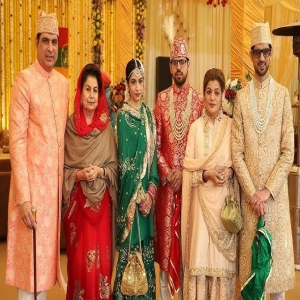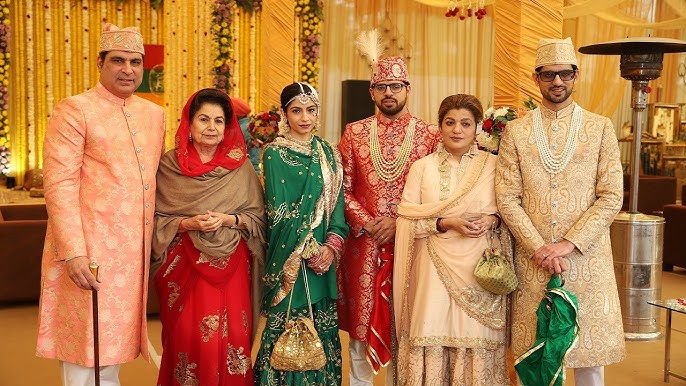
.jpg) Vidya Bhushan Rawat
Vidya Bhushan Rawat

Indians simply love big fat weddings. We recently saw the wedding of the 'meritorious' son of an extraordinarily powerful business family, which is being 'claimed' as a marriage of the century. Celebrities of the spineless tinsel world, as well as hypocritical political classes from India and big corporate networks from different parts of the world, joined hands and celebrated. Of course, many saffron robe Mahatmas and Babas were seen cherishing the moment at the truly 'sanatan' wedding, making every 'Hindu' proud of the great achievement.
For the last six months, social media has been inundated with 'clips' of the fat Indian wedding, which is now being projected as an ideal wedding with lectures by the tycoon and his better half. The nation is being 'obliged' with these 'personal' clips of celebrities and stars 'behaving' as 'common' people. No one is speaking about the bride and groom but the ultimate mom, her sarees, accessories and great talks of 'wisdom' about our 'great' 'culture', including 'kanyadan'. The babas and sadhus who give great gyan on how and what an ideal 'Hindu' woman should wear were silently enjoying the warmth filled with the aroma of artificiality.
Many people have criticised the lavish expenditure on the wedding, while others have found such criticisms to be the proverbial 'grapes turned sour' situation. Many of those who attended the wedding said that people should not bother about the extraordinary expenses incurred as it ultimately helped create 'work' and business; hence, thousands of people must have benefitted from it.
The Indian middle class aspire to and eagerly devours such exhibitions of power and connections by industrialists, journalists, and public personalities (Page 3 became prominent due to such gossip). In the 1980s, a fat Indian wedding in Gwalior was the talk of the town. Madhavrao Scindia's daughter's wedding got massive criticism in the media for lavishness. Media criticised it then, but it is impossible for the Manustream media to even question anything today. The Brahmanical elite wants to find ways and means to justify their actions, but one fact is that these marriages are places for networking and flexing their wealth.
In Bombay's tinsel world, Raj Kapoor started his envy-inducing parties, particularly on Holi, and hence was named the greatest Showman of Indian Cinema. Industrialists, most of the time, rarely displayed their wealth. In the 1990s, Subrata Roy of Sahara India changed that, and his Sahara City in Lucknow became a centre of activity for all the power elite of the country. Cinema stars, cricketers, politicians, literary figures, etc., were all at Sahara City in Lucknow for specific events. Mulayam Singh Yadav, Chandrashekhar, Amitabh Bachchan, Anil Ambani, Sachin Tendulkar, Jayaprada and Amar Singh were the leading stars of Sahara events, but that is in the past now.
Reliance, started by Dhiru Bhai Ambani, used the power connection to rise high. Connections with Gandhis were used well, but that became the bone of contention between Rajiv Gandhi and his finance Minister, Vishwanath Pratap Singh. Indian Express and Nusli Wadia significantly aggravated it further as Editor Arun Shourie then launched an extremely personal campaign against Reliance. That was when Income Tax notices were served to various industrialists, and they complained against the finance minister. Soon, VP was shunted out of the Finance Ministry rather unceremoniously and made Defence Minister. That showed the power of corporates in India, who could get an honest and effective finance minister out of ministry when all he sought was accountability and action against wrongdoing. Corporates succeeded in drawing room manoeuvres, but VP won the war of perception among the masses as a lone fighter against corruption, and the result was Congress' downfall.
The UPA governments under Dr Manmohan Singh were the best period for corporate houses to strengthen themselves, and it was said that Pranab Mukherjee was the biggest friend of the Ambanis. The Gandhi family's decision not to attend the wedding was politically important since Rahul Gandhi has been speaking about corporate corruption in his political rallies. Actually, this decision may prove beneficial; otherwise, this media would have trashed his future campaigns. It is another matter that all the near dear ones of Gandhis were there at the wedding, but yes, this is pure politics. Right from Mamata to Lalu and, Akhilesh and their families were all present. The exceptions were left parties, MK Stalin and BSP chief Mayawati, but we don't know whether they were invited. The sad part is that it is a poor reflection of our political class and democracy itself and how most of the colonial democracies are now controlled by corrupt corporations. The slogans of "social justice' and 'secularism' look empty and rhetorical when you hear these champions speaking again.
One does not know why the Indians are so obsessed with them, but the reality is today, these obscene weddings are made to look glorious in the artificial surroundings of glamour. We are told that marriage is a personal affair, and everyone has a right to do what they wish, but was this a personal affair when state apparatus was being used, roads were closed, and airports were converted into private domains to ensure the guests reached the venue without any hassle. Apart from that, not only are the social media pages, but the corporate media has also made every effort to push them into our minds in an attempt to legitimise everything.
Even when the marriage is over, we are still being provided the clips of "words of wisdom' by the Ambanis, and the casteist middle class is simply overjoyed, claiming 'it is his money and he can do anything. The jaati elite wants us to believe we should mind our business and focus on our work. However, is it that simple? Why are these gossip clips being released or planted every day? Do we rejoice that India has got a new badshah and begum? The babas are overwhelmed by this 'love for Indian values" by one of the most powerful men in India. I loved what Jitan Ram Manjhi, the Union Minister, said when someone asked him whether he would attend the marriage. He said, "We are from a rural background. It is a complete waste of money." The women present there were wearing revealing dresses, which for him looked obscene; hence, in such a situation, "how could one take his wife, daughter and daughter-in-law there? Hence, we did not go there." He said, "We did not go there as we would not be able to settle in that richness and grandeur. That wedding is only and only a display of money. That was not a wedding but a display of money."
One may or may not agree with Jitan Ram Manjhi, but most religious gurus and babas who preach at length to women and girls about how to wear and what, as per "Bhartiya Sanskriti," kept quiet throughout the entire episode. Perhaps they are happy that the son of one of the richest persons in the world did not marry a Gori or Christian woman, which is enough for "Bhartiya Sanskriti." The fact that all the right-wing echo system is celebrating because it gives justification to the "divinely ordained" Brahmanical value system where marriage is not between two 'individuals' but two 'families' as Nita Ambani said so 'graciously'. No question whether these two families should be from the same 'caste' or not.
We are then given the 'gyan' or wisdom of greatness of 'kanyadan' and how 'daughters' are 'blessings' and that marriage is not a promise for one life but seven lives. Everybody enjoys such 'spiritual' talks of 'saat janmo kaa bandhan' (bond lasting seven lifetimes). Indians, after all, don't live in the present. They either rejoice in a golden past or dream of a diamond future. For most Indians, the present has become 'uncertain' because of bombastic talks combined with little in terms of delivery. Most of the time, a girl's parents in India complain about having fulfilled all the dowry requirements, and yet things go bad because the boy's parents are greedy. People bend over to put their best foot forward by succumbing to dowry demands, yet things go hopelessly wrong.
Dowry is a big issue, and such lavish weddings only promote it. Dowry deaths and domestic violence against women continue unabated in India, and a majority of them, under the name of protecting "culture and society", don't even dare to file cases with the police. According to the National Family Health Survey (NFHS), 2019-2021, 29.3 per cent of married Indian women between the ages of 18 and 49 have experienced domestic/sexual violence; 3.1 per cent of pregnant women aged 18 to 49 have suffered physical violence during their pregnancy. It further says that 87 per cent of married women who are victims of marital violence do not seek help.
Another serious matter is the crisis of our marriage system and the concept attached to it. While such 'concepts' look beautiful when everything is great, they turn horrific when a crisis emerges in the marriage as it virtually closes all the doors, particularly for women, once the marriage is either broken or the spouse is no more. India is considered to be one of those countries where widowhood is actually a curse. The wonderful seven lives bond theory actually closes all options for her, including a remarriage. Widowhood is defined as the status of an individual legally married to someone who subsequently died. As per the 2011 census, there are 5.6 crore widowed persons in India. Women outnumber men, accounting for nearly 78% of the total widowed population.
It would be better for us to understand the gravity of our social crisis, which ultimately affects both men and women. Let us not hide the dirty discriminatory practices in the garb of 'glorious traditions.' The weddings where tradition is hyped are nothing but a legitimisation of unequal social order, which we refuse to accept. How many noticed the bride's parents in the 'wedding of the century.' Well, you might not have, but that is what our marriages are, where the bride's family has to just stand with folded hands and wait for the 'comments' of the bridegroom. Our barats and shadis are the best reflection of the prevailing problems in our society.
Let us not worry about seven lives and focus on improving our lives here; for that, our constitutional values should become our morality. Let us clarify that only constitutional morality will ensure a strong and united India where citizens have equal rights irrespective of gender and religion. Let the women of India remember Baba Saheb Ambedkar for his historical work through the Hindu Code Bills. Remember, those glorifying and glamourising the iniquitous order are the same who opposed the Hindu Code Bills and abused Jawahar Lal Nehru and Baba Saheb Ambedkar. It is time we take a few lessons from our history and move ahead.